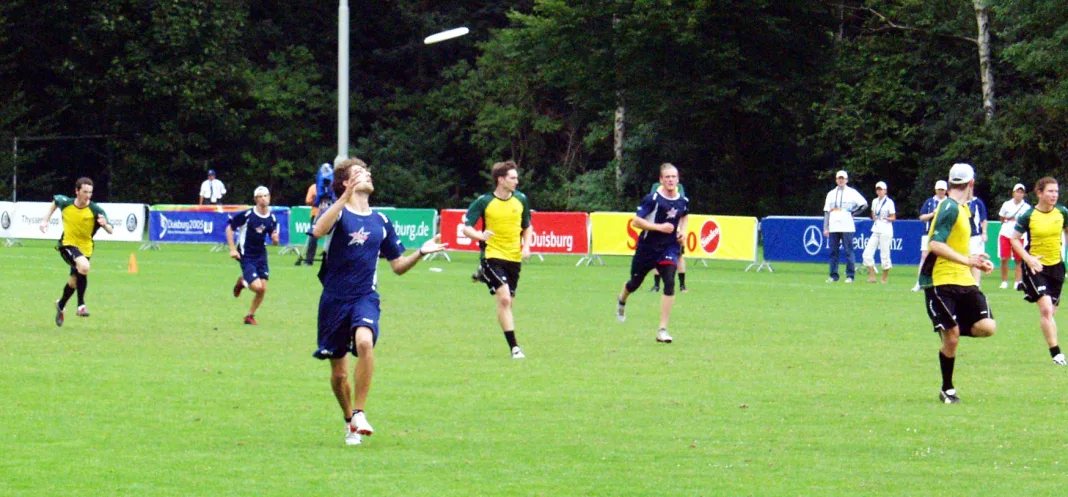One of my best friends came back touting plastic discs and football boots one day and that’s all it seemed to take for her to become frisbee obsessed. What followed were nights spent watching grown adults dive to the ground after flying saucers, videos of her chucking white circle after white circle into the air, and the epitome – the running joke within our friendship group – a week spent chucking plastic discs around for her country.
Don’t get me wrong, the sheer athleticism and general fitness required for frisbee is astounding – players easily rack up the kilometres cutting up and down the field. However, the way in which such energy is spent, at least from a bystander’s perspective, seems like a bit of a waste of time. Why not play a contact sport? A sport that has a referee? A sport that doesn’t require an irritating amount of skill to actually make an adequate pass? All of these things tend to be what put people off – just stick to kicking a football around. But it is for these reasons that I also fell inexplicably in love with my friend’s sport – and maybe why you should too.
Ultimate frisbee is a non-contact, self-refereed, mishmash of netball and American football. Two ‘endzones’ separate a field of two teams attempting to pivot and pass the frisbee to their respective scoring ends. Wherever the frisbee is intercepted or dropped, possession passes to the other team meaning play essentially restarts and everyone switches to running back up to the opposite end of the field. Points can last for minutes like this, meaning frisbee is no mean feat of endurance.
The first hurdle however, is overcoming a beginner’s ability to throw a frisbee. For many of us, this may only extend to an attempted backhand throw of no more than five metres, which in actuality wobbles barely past the two metre mark before plummeting back down to terra firma. You quickly learn to be humbled by the thin curve of plastic that many experienced players can welly up to the length of a 100 metre pitch – but that is not to say that learning to throw a disc efficiently should be a deterrent. The ultimate frisbee community has some of the most accommodating and welcoming sports players you will come across, thus learning to throw is a matter of turning up and asking. Maybe it’s the lack of referees that instils an extra level of kindness and patience, but the sport generally seems to foster an approachable community of individuals looking to expand their sport to the masses.
Originating in New Jersey, America, the sport developed itself originally as a casual lifestyle sport, but it has fast grown semi-professional with a sprawling international scene. The World Flying Disc Federation (WFDF) hosts annual international competitions all over the world with European names such as Levke Walczak and Lili Trautmann starting to beat the Americans at their own game. Ultimate frisbee is now one of the fastest-growing sports in the UK – in 2022, United Kingdom Ultimate (UKU) had a membership of 4,500 people participating in club games and tournaments, and it is estimated that the game is played by over five million players worldwide.
Ultimate supports divisions for mixed, ‘womxns’ and ‘mxns’ play and newcomers are welcome to play for all divisions to which they apply. At the higher levels, rules state a minimum three or four of seven players must be ‘womxn’ per point and despite being a male dominated sport in Oxford, there is a strong emphasis placed on having at least some female matching players playing for each point in mixed games. Players sub on and off at their own volition on a point-by-point rotational basis and the level of skill possessed by a player is never a deciding factor in who should play – everyone is encouraged to get throwing.
The lack of a referee is not a sign of the sport’s weakness, but of its strength. Fouls, actions of contact and general rule-breakage are discussed amongst players during paused game play, making the game both somewhat light-hearted but also very player-oriented – frisbee has no hierarchy and cultivates a large amount of mutual team and player respect for this reason.
There is just something about relentlessly chasing a frisbee up and down the field that gets you buzzing. Sometimes it’s the smoothness and the impeccable ‘flow’ of the disc flying from player to player, or the speed and tactical agility of a turnover that makes the game addictive to both watch and play. You sub off, catch your breath, and run back on again for the next point – are we crazy, or have you just not tried it yet?


